Next door to the former Conservative Club is the Sun Hotel. Previously known as the Sun Inn, it replaced an earlier inn of the same name. This inn gave Sun Street its name during the 17th century. However, for the preceding two centuries, the thoroughfare had been known as Angel Street, after the Angel Vaults Inn which stood next to the Sun Inn. The Angel had the date 1450 on its façade. It was later rebuilt, but was eventually declared unsafe and demolished in 1956.
Prints and text about the beginning of Hitchin.
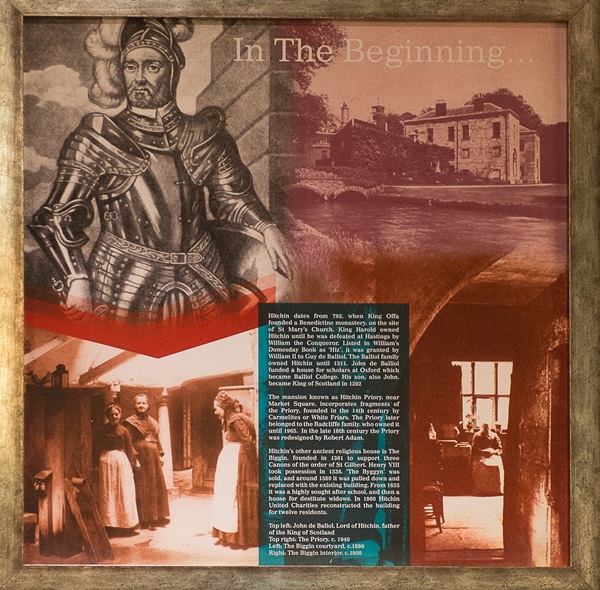
The text reads: Hitchin dates from 792, when King Offa founded a Benedictine monastery, on the site of St Mary’s Church. King Harold owned Hitchin until he was defeated at Hastings by William the Conqueror. Listed in William’s Domesday Book as ‘Hiz’, it was granted by William 2 to Guy de Balliol. The Balliol family owned Hitchin until 1311. John de Balliol funded a house for scholars at Oxford which became Balliol College. His son, also John, became King of Scotland in 1292.
The mansion known as Hitchin priory, near market Square, incorporates fragments of the Priory, founded in the 14th century by Carmelites or White Friars. The Priory, later belonged to the Radcliffe family, who owned it until 1965. In the late 18th century the Priory was redesigned by Robert Adam.
Photographs and text about the Lucas Brewery.
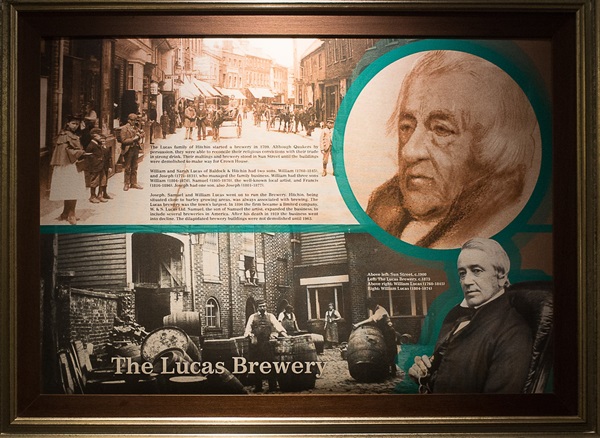
The text reads: The Lucas family of Hitchin started a brewery in 1709. Although Quakers by persuasion, they were able to reconcile their religious convictions with their trade in strong drink. Their maltings and brewery stood in Sun Street until the buildings were demolished to make way for Crown House.
William and Sarah Lucas of Baldock & Hitchin had two sons. William (1768-1815) and Joseph (1771-1831) who managed the family business. William had three sons William (1804-74), Samuel (1805-70), the well-known local artist and Francis (1816-96). Joseph had one son, also Joseph (1801-77).
Joseph, Samuel and William Lucas went on to run the brewery. Hitchin, being situated close to barely growing areas, was always associated with brewing. The Lucas brewery was the town’s largest. In 1896 the firm became a limited company, W&S Lucas Ltd. Samuel, the son of Samuel the artist, expanded the business to include several breweries in America. After his death in 1919 the business went into decline. The dilapidated brewery buildings were not demolished until 1963.
Photographs and text about the Hitchin Conservative Club.
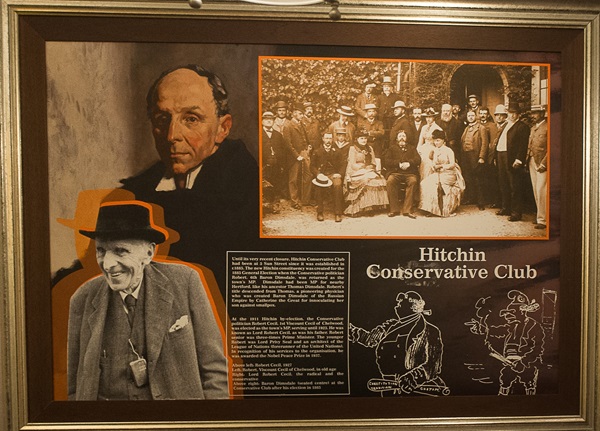
The text reads: Until its very recent closure, Hitchin Conservative Club had been at 5 Sun Street since it was established in 1885 General Election when the Conservative politician Robert. 6th Baron Dimsdale, was returned as the town’s MP Dimsdale has been MP for nearby Hertford, like his ancestor Thomas Dimsdale. Roberts title descended from Thomas, a pioneering physician who was created Baron Dimsdale of the Russian Empire by Catherine the Great for inoculating her son against smallpox.
At the 1911 Hitchin by-election, the Conservative politician Robert Cecil, 1st Viscount Cecil of Chelwood, was elected as the town’s MP, serving until 1923. He was known as Lord Robert Cecil, as was his father. Robert senior was three-time Prime Minister. The younger Robert was Lord Privy Seal and an architect of the League of Nations forerunner of the United Nations. In recognition of his services to the organisation, he was awarded the Nobel Peace Prize in 1937.
Above left: Robert Cecil, 1927
Left: Robert Viscount Cecil of Chelwood, in old age
Right: Lord Robert Cecil, the radical and the conservative
Above right: Baron Dimsdale (seated centre) at the Conservative Club after his election in 1885.
Photographs and text about Bob Hope.
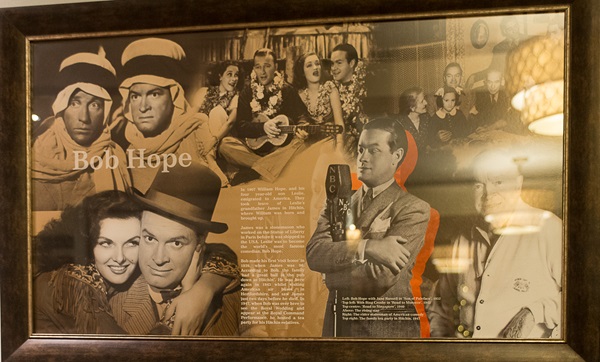
The text reads: In 1907 William Hope and is four-year-old son emigrated to America. They took leave of Leslie’s grandfather James in Hitchin where William was born and brought up.
James was a stonemason who worked on the statue of liberty in Paris before it was shipped to the USA. Leslie was to become the world’s most famous comedian, Bob Hope.
Bob made his first ‘visit home’ in 1939, when James was 96. According to Bob, the family ‘had a great ball in the pub down in Hitchin’. He was here again in 1943 whilst visiting American air bases in Hertfordshire, and saw James just two days before he died. In 1947, when Bob was over here to see the Royal Wedding and appear at the Royal Command Performance, he hosted a tear party for his Hitchin relatives.
Old photographs of Hitchin.
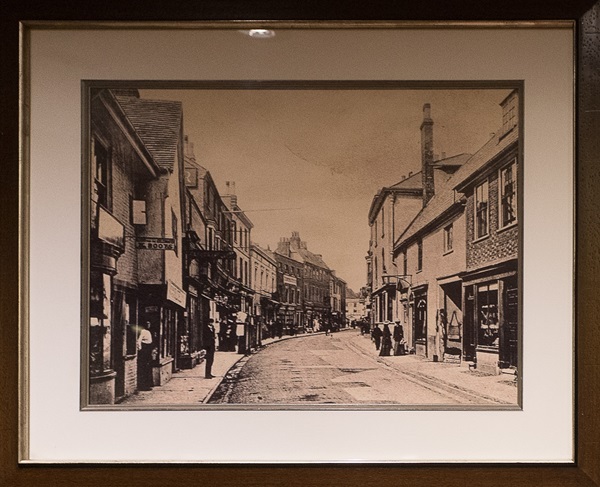
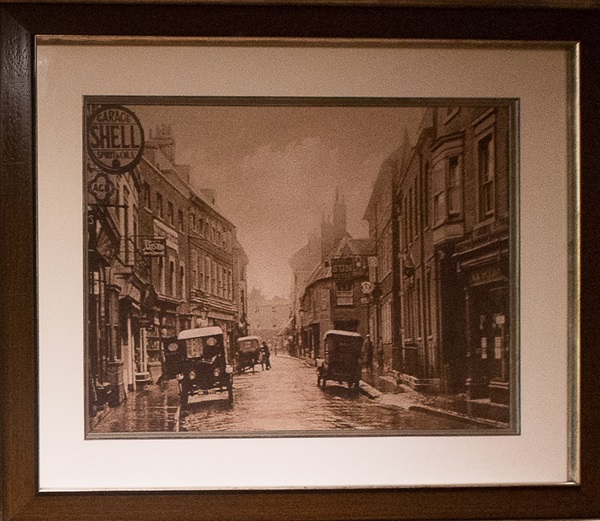
A photograph looking towards The Trooper (later Moss’s Corner), 1865.
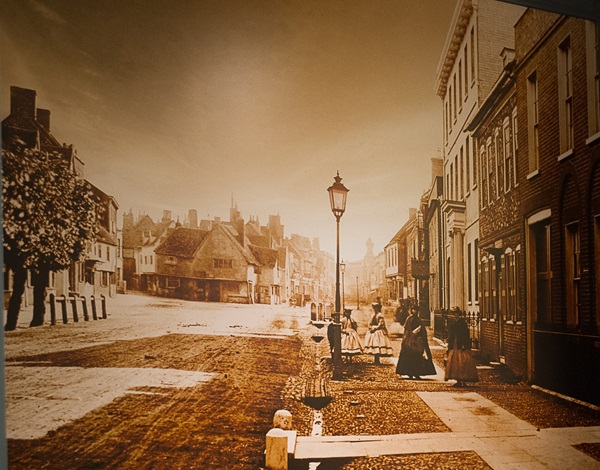
The Trooper became WB Moss’s provision shop. The building was demolished in 1899 and replaced by new premises for WB Moss.
External photograph of the building – main entrance.
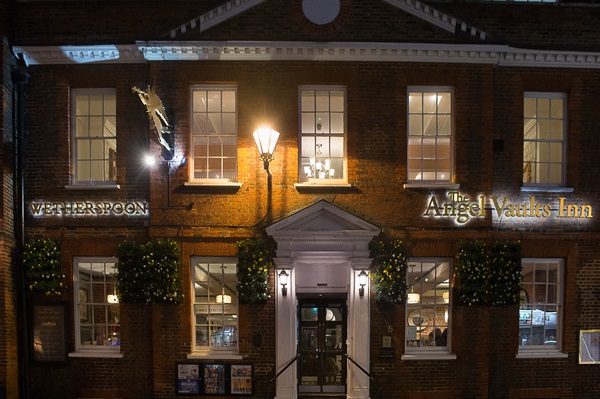
If you have information on the history of this pub, then we’d like you to share it with us. Please e-mail all information to: pubhistories@jdwetherspoon.co.uk